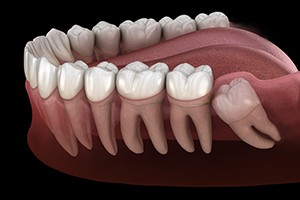
Wisdom Tooth Extractions – East Hartford, CT
A Precaution to Protect Your Oral Health

Most people develop a third set of molars during their teens or early twenties. While some individuals can retain these “wisdom teeth” for a lifetime and suffer no problems because of them, others need to get them removed as a precaution to protect their oral health. That is because most people’s mouths are too small to accommodate their wisdom teeth. Here at Comprehensive Dental Associates of Central Connecticut, we have all the skills and equipment necessary to perform wisdom tooth extractions in East Hartford, CT.
Why Choose Comprehensive Dental Associates of Central Connecticut for Wisdom Tooth Extractions?
- Patient Comfort is a Top Priority
- Highly Trained Dentists and Support Staff
- Prevent Future Dental Problems
What Are Wisdom Teeth?

Wisdom teeth are the third set of molars, which are located at the very back of the mouth. Most people develop four wisdom teeth, one in each quadrant of their mouth, though some individuals develop more or fewer. Experts believe that ancient human ancestors needed these teeth to consume a rough diet. Modern food processing has made them unnecessary.
Why Do Wisdom Teeth Need to Be Removed?

Some people can keep their wisdom teeth without any adverse consequences. However, these teeth can be problematic for many individuals. They may cause issues like:
- Overcrowding
- Cysts
- Infections
- Oral hygiene challenges
- Pain
- Jaw stiffness
Often, such problems arise because a person’s mouth is too small to accommodate their wisdom teeth. As a result, the teeth can become impacted (stuck fully or partially beneath the gumline).
Our team can assess your wisdom teeth and let you know whether they should be removed.
What to Expect from the Wisdom Teeth Procedure

Because wisdom teeth are far back in the mouth and are often impacted, removing them is more complex than performing a routine tooth extraction. In order to access the wisdom teeth, we may have to create an incision in the gums and/or break the teeth into pieces. After the teeth are out, we close any incisions. Sedation and anesthesia ensure that patients feel little to nothing during the extraction procedure, but it is normal to experience some swelling and discomfort afterward.
Recovering from Wisdom Teeth Extraction

Most people are back to feeling normal within 1 – 2 weeks after their extraction appointment. During that time, swelling and soreness are to be expected. There may also be a bit of bleeding in the first few days.
Here are some tips to support your body’s healing process:
- Eat a soft, mild diet.
- Take medications as prescribed.
- Stick to a thorough oral hygiene routine (be gentle around your extraction sites).
- Do not smoke.
- Do not drink through a straw.
- Call us if you have any questions or concerns during your recovery.
Understanding the Cost of Wisdom Tooth Extractions

The cost of wisdom tooth extractions can vary from case to case. It depends on several factors, which we will consider before providing your personalized cost estimate. Our team will also be happy to help you understand your payment options, such as financing from third-party lenders and dental insurance. We do not want you to be overly stressed about the monetary aspect of your care, so feel free to ask us questions. We are always happy to assist patients in whatever way we can.
Factors That Can Impact the Cost of Wisdom Tooth Extractions

Some factors that may influence the cost of your wisdom teeth extractions include:
- The number of teeth that need to be removed. You might choose to remove only the wisdom teeth that are currently causing problems, or you might opt to get all four removed at once. Some patients never develop a full set of wisdom teeth, so we can only remove the ones that do appear.
- Whether the teeth are impacted. Impaction (a state where a tooth is stuck fully or partially beneath the gumline) can make the procedure more complex and lead to higher fees. The type of impaction (whether the tooth is stuck in the soft tissue or the jawbone) can also influence cost.
- We sometimes sedate patients during wisdom tooth removal. The type of sedation used can affect its cost. Nitrous oxide and oral conscious sedation tend to be the more affordable options.
Does Dental Insurance Cover Wisdom Tooth Extractions?

Many dental insurance plans do cover wisdom tooth extractions. If the teeth are fully grown and not impacted, removing them may be classified as a basic service, which means that up to 80% of its cost may be covered. More often, this procedure is categorized as a major service, so the coverage rate may be around 50%. Our practice welcomes insurance, and we will be happy to help you figure out how your benefits may apply.
Other Options for Making Wisdom Tooth Extractions Affordable

Outside of insurance, other provisions that might make it easier to afford wisdom tooth extractions include:
- Most patients qualify for a low-interest payment plan through a third-party lender, such as CareCredit or Sunbit.
- In-house discount plan. Our membership savings plan provides reduced fees on many services. It is especially beneficial for patients without insurance coverage.
Wisdom Tooth Extraction FAQs
Why Do We Have Wisdom Teeth?
Even though wisdom teeth seem like nothing but trouble in modern times, there is actually a very good reason why we have them! Ancient human ancestors ate a rough diet, which included tough and chewy things like seeds, nuts, and raw meats. As you might imagine, that type of eating could take a toll on their teeth. By the time they reached early adulthood, a third set of molars — the wisdom teeth — was very valuable.
Throughout the ages, food processing techniques and eating utensils have come a long way. We no longer need wisdom teeth, and most humans do not even have a mouth that is large enough to accommodate them. Eventually, we may reach the point where no one develops any wisdom teeth at all.
Does Everyone Have Wisdom Teeth?
Most people develop four wisdom teeth, one in each quadrant of their mouth. However, it is becoming increasingly common for people never to get any wisdom teeth. In fact, one broad estimate published in the Dental Research Journal states that somewhere between 5% and 37% of people are missing at least one of their wisdom teeth.
Of course, it is important to remember that even if you cannot see your wisdom teeth, you might still have them. They may simply be beneath your gumline. You might need an X-ray to find out if they are present.
How Should I Prepare for My Wisdom Tooth Extraction?
One thing you can do to prepare for your wisdom tooth extractions in East Hartford is to have a talk with your dentist. Feel free to ask questions about the procedure and what you can expect during your recovery period. Being well-informed can help you commit to your procedure with confidence!
Also, keep in mind that you might be sedated during your extraction appointment. Depending on the type of sedation used, your dentist in East Hartford might instruct you to fast for several hours before your procedure. You might also need to arrange for a trusted adult to drive you to and from our office.
How Do You Make Wisdom Teeth Pain Go Away?
The only way to permanently end wisdom teeth pain is to get them removed. Before your procedure, you may be able to reduce your discomfort by taking some simple measures:
- Take over-the-counter pain medication as needed. Ibuprofen or aspirin may work well.
- Apply an ice pack to the outside of your cheek for 20 minutes at a time.
- Eat soft foods that are easy to chew.
- Keep the area around your wisdom teeth clean.
- Apply a topical numbing gel, such as Orajel, if necessary.
- Regularly rinse your mouth with warm salt water.